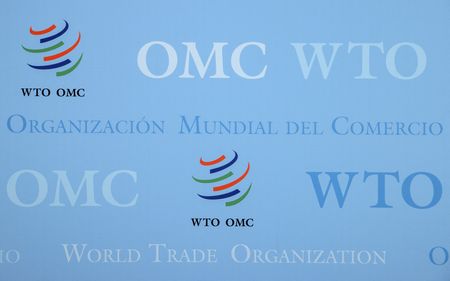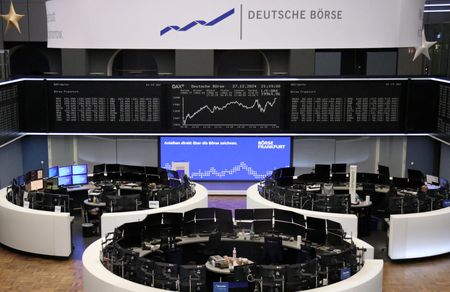By Joe Cash, Josh Arslan, Casey Hall and Liz Lee
BEIJING (Reuters) – Chinese officials and ordinary people are hopeful but on edge as Donald Trump returns to the White House, eager to avoid a repeat of the bruising trade war that drove a wedge between the economic superpowers during his first term.
Chinese Vice President Han Zheng, in meetings with Tesla CEO Elon Musk and other members of the U.S. business community in Washington ahead of Trump’s inauguration, said he hoped U.S. companies would “take root” in China and help to stabilise bilateral relations, the official Xinhua news agency reported.
When Trump was last president, he heaped tariffs on more than $300 billion of Chinese imports. In recent months, he has said he would add tariffs of at least 10% on top of what is already imposed on Chinese goods, a move that would hurt China at a time when its economy is struggling to find a firm footing.
At the same time, the U.S. president-elect made the seemingly conciliatory move of inviting Chinese President Xi Jinping to attend his inauguration on Monday. Xi sent Han in his place, a gesture of goodwill given that China was only represented by its ambassador at the previous two U.S. presidential inaugurations.
At their meeting on Sunday, Han told Musk, appointed by Trump to lead a department aimed at creating a more efficient U.S. government, that he “welcomed Tesla and other U.S. companies” to share in the benefits of China’s development and contribute to China-U.S. relations.
The vice president’s meeting with U.S. businesses was chaired by FedEx CEO Rajesh Subramaniam on the U.S. side, and included the heads of eight U.S. firms from a range of industries including technology, banking and logistics, according to an American executive in the room, who added that the meeting over-ran its allotted time and was very cordial.
“(Han Zheng) is seen as someone, because of his time in Shanghai, who understands the concerns of the foreign business community, he understands the economy,” Michael Hart, president of the American Chamber of Commerce in China, told Reuters in Beijing.
“It’s a nice fig leaf, or whatever you want to call it, so that’s positive.”
Xi and Trump were upbeat after speaking by phone on Friday, with Trump calling it “a very good one” and Xi saying he and Trump both hoped for a positive start to U.S.-China relations.
Mao Ning, a Chinese foreign ministry spokesperson, referred to “a new starting point” in China-U.S. ties at a regular news conference on Monday.
Shares in mainland China and Hong Kong rose on Monday.
DEJA VU
But for all the bonhomie between the two superpowers, a sense of deja vu lingers among those who remember how quickly ties deteriorated during Trump’s first term.
“From now on, until the situation becomes a little bit clearer, all our U.S. clients have to pay in advance,” said Dominic Desmarais, chief solutions officer at Lira Solutions, a Suzhou-based firm that connects Chinese manufacturers with overseas buyers of everything from toys to furniture and titanium products.
“If Donald Trump actually imposes 40%, or whatever, duties on Chinese products coming into the United States, I don’t want to be stuck with custom-made goods for specific clients that just disappear,” he added.
“That happened a lot, seven, eight years ago, when Donald Trump put 25% duties on 85% of the commodities coming out of China.”
Another trade war would find China much more vulnerable than when Trump first raised tariffs in 2018, as it grapples with a deep property crisis, huge local government debt and 16% youth unemployment, among other challenges.
The precariousness of China’s situation is not lost on the streets of its capital.
“What I can see is that China’s economy is not very good at the moment, due to the impact of the pandemic, and (the fact that) Trump himself is a crazy, wild person (doesn’t help matters on our side),” said a Beijing resident surnamed Wang, 36.
“The pressure still remains quite big (for us).”
The effects of the last trade war continue to be felt in the world’s second-largest economy, where foreign firms are holding off on investing and diversifying their supply chains by putting more money into alternative nearby markets, such as Vietnam.
Christopher Yeo, a finance director at a Singapore-owned digital infrastructure company in Beijing, said he expects Trump’s tariff threats to continue to pinch on cross-border investment and financing from the U.S. and other West-aligned nations.
His firm’s current source of funding is from non-U.S. shareholders, and, therefore, he said he does not expect Trump’s return to the White House to impact on his life in China.
“But I would imagine U.S. institutional investors would continue cutting back on their Chinese exposure,” he said. “There used to be a few U.S. firms invested in Chinese infrastructure as well – that is non-existent now.”
(This story has been refiled to correct the spelling of ‘Christopher’ in Paragraph 21)
(Reporting by Joe Cash, Josh Arslan, Casey Hall and Liz Lee; Editing by Christian Schmollinger, Stephen Coates and Raju Gopalakrishnan)











